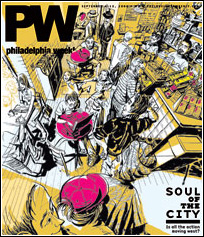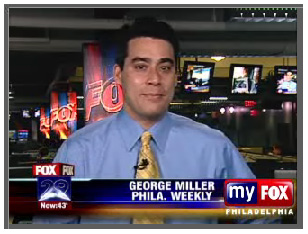Yes We Can?
After convincing Pennsylvania voters to believe in Hillary, Rendell will almost certainly be soon asking them to switch to Obama.
From the May 28, 2008 Philadelphia Weekly

The four students from Parkway Northwest High School for Peace and Social Justice exit the International House stage after presenting an ambitious recycling program they want the School District to adopt. The crowd of around 100 applauds politely.
State Rep. Dwight Evans, dressed in a gray suit with a pink shirt and no tie, grabs the microphone.
"It starts with them," Evans says. "We want young people to take ownership of their environment."
The Parkway program and the upcoming presentations by Imhotep Institute and Martin Luther King High are all part of this year's Dwight Evans Leadership Summit, the third annual event sponsored by the longtime West Oak Lane politician.
"Young people need to understand citizenship," Evans insists. "You all play a role in government, in society."
As Evans makes his passionate appeal, the doors of the theater burst open, and Ed Rendell lumbers into the auditorium.
The governor waves to the audience with both hands in the air, testing the strength of the single button keeping his suit jacket closed around his generous torso. He smiles and takes the microphone from Evans, who quickly realizes that the Dwight Evans Leadership Summit has just become part of the Ed Rendell traveling sideshow.
"When people turn out and vote, and when they register in high levels, the money doesn't matter anymore," Rendell raps. "The only thing that can counteract the effect of money on politics is the effect the people can have."
Rendell tells a few jokes and ardently pleads with the cheering crowd to get involved in politics.
"The more we participate in what we do in the government," he says, "the better that government is going to be."
His comments over, nearly everyone in the room lunges forward, crowding around Rendell and Evans, and flashes pop for the next 20 minutes. Students jockey for position, teachers rush into the frame with childlike grins, parents push their kids forward - all want to be photographed with Ed.
The crowd, so civilized before, buzzes with energy and excitement, and the summit temporarily grinds to a halt.
All because of Big Ed, the gregarious, sports-loving, paunchy everyman who may be the most popular Philadelphia politician ever, a man who many think might control the course of the upcoming presidential election on the sheer strength of his relentless vigor.
***
With Pennsylvania up for grabs in the presidential election, our second-term governor, former two-term mayor and two-term district attorney now sits in the pressure-packed position of trying to swing Pennsylvania Democratic.
To get the White House, many political analysts believe Pennsylvania is key.
The state is so much in play that Rendell's name keeps surfacing when speculation begins about who will be on the bottom half of the Democratic ticket in the fall.
But with Obama almost certain to be the party's presidential nominee, Rendell, 64, finds himself in the wrong corner. During the two-month run-up to the Pennsylvania primary in April, Rendell roamed the state championing the cause of Hillary Clinton, who took the state by a nine-point margin.
Now, after convincing Pennsylvania voters to believe in Hillary, he'll be asking them to switch their allegiance to Obama.
While the glow of Rendell's mayoral tenure still shines bright, polls say our love of Ed has diminished.
On top of that, the directness and zeal that drives Rendell's popularity here doesn't necessarily hold in the rest of the state where they focus more on his actions than his charm.
Love him or hate him, better get used to him - again.
Our leering, jocular, quick-tempered, deal-making, death penalty-pushing No. 1 political celebrity is going to be in the national spotlight big time over the next six months.
***
A crowd of about 15 people follows Rendell looking for more pictures as he exits International House.
He poses against a cinderblock wall, puts his hand on a young child's head and grins while flashes pop.
"Who knows when you'll get a chance like this!" a camera-toting teenager says before running back into the theater.
After the governor pulls away from his admirers, he says, "In all the time I stumped during the seven-week primary campaign, I never said negative comments about Obama."
Prone to sticking his foot in his mouth - like when he declared the 2000 presidential race over before Al Gore could process the Supreme Court's recount decision - Rendell has tried to be careful recently not to generate YouTube fodder.
"In fact, I was on a couple of TV shows and they asked, 'Do you think Sen. Obama is fit to be commander in chief?'" the governor says. "And I said, 'Absolutely. I just think Sen. Clinton is more ready and more fit.' But that doesn't mean I think Sen. Obama isn't."
Even now, when all seems lost, Rendell isn't conceding the nomination for Clinton. But he knows when Obama becomes the nominee, he'll have to sell the party's message.
"The women voters who are the strongest of the Clinton supporters - the ones who tell the pollsters they aren't going to vote for Sen. Obama - my message to them is: The next president is likely to appoint three Supreme Court judges, which would determine the makeup of the court, maybe for the next 15 or 20 years," Rendell says. "You're not going to hand that much influence to John McCain, who says Justice Alito or Justice Roberts is the type of justice he wants to appoint. You want someone like Sen. Obama making those appointments."
He shrugs off the notion that he could lend strength to Obama as his running mate.
"I think Obama-Clinton, if Obama is the nominee," Rendell says. "If not, I think Obama-Joe Biden is the best ticket."
***
There are many appearances to go, and the governor has to hit the road. He follows his security guard toward the International House exit, then stops for a moment and returns up the steps.
He walks past the theater lobby to the cafe and orders a cup of vanilla ice cream. Within minutes, he's behind the counter with his arms around cafe employees Jose Hernandez and Manuela Tavarez, and the security guard is snapping a picture.
"He tried to pay for it," says Hernandez of the $3.90 treat. "But I gave it to him."
Hernandez, turns out, has been a longtime supporter of Rendell, having worked as a translator on his mayoral and gubernatorial campaigns.
"Yeah, I like Ed," Hernandez says.
***
Rendell becoming the vice presidential candidate may not be as far-fetched as you think.
Back in 2001 he told Salon he considered making a run for the White House in 2004 - as president.
Instead, in 2002, he became governor of the sixth largest state in the country with a crucial 21 electoral votes.
"There aren't many ways to get to 270 electoral votes without carrying Pennsylvania," says Chaka Fattah, powerful congressman, superdelegate and Obama supporter, referring to the electoral votes needed to win the presidency. "The governor on the ticket would obviously put Pennsylvania in the Democratic column."
As a veep candidate, Rendell would bolster Obama's executive-level experience. Rendell also has a strong record on environmental and energy issues - which could be important in an era of $4-a-gallon gas. Most important, Rendell could draw the spurned Hillary supporters - in Pennsylvania and elsewhere - who might still be smarting from being edged out by the young upstart.
"Because of his support of Sen. Clinton, he's even more important than he would be if he were an Obama supporter," says Michael Hagen, director of Temple University's Institute for Public Affairs. "It's absolutely critical for the Obama campaign to convert some of those Clinton supporters into Obama supporters."
The national press corps likes Rendell's forthrightness. Before Giuliani and 9/11, Rendell was "America's mayor," lauded by the media for saving Philadelphia from its postindustrial economic gloom.
"Obama has had real difficulty in winning large industrial states like Pennsylvania," says Donald Kettl, director of the Fels Institute of Government at Penn. "He has difficulty appealing to working-class voters. He's had difficulty in the racial crossover, in particular with working-class white guys. That's the base he's had the most difficulty with, and Pennsylvania's full of people like that - Hillary Clinton's kind of voters."
***
If Pennsylvania is as pivotal as everyone seems to think, many of the biggest battles for the White House may take place in our densely populated backyard.
"Ultimately there's the question about what happens in the suburbs around Philadelphia, where the real battleground is," Kettl says. "Democrats need to cement the gains they've been making there. It's up for grabs because some of those 'burbs wound up being a lot more competitive than the Obama people had hoped."
In the primary, Clinton topped Obama in Montgomery County 51 to 49 percent, and she pulled nearly two out of three votes in Bucks County. In 2006 Rendell won both counties - loaded with Reagan Democrats and Rendell Republicans - while winning reelection. He drew 70 percent in Bucks and 72 percent in Montgomery.
Despite Pennsylvania gaining more than 328,000 new Democratic voters over the past year - around 148,000 in the Philadelphia region alone - there is fear that working-class voters might snub a black candidate, especially one perceived as being culturally liberal.
"Blue-collar, working-class voters are up for grabs," says Terry Madonna, director of the Center for Politics and Public Affairs at Franklin & Marshall College. "Not all of them. Many of them will vote for a Democrat because they're Democrats. But McCain competes with Obama pretty well in our state."
Enter Ed Rendell.
"It becomes a much more challenging state for Republicans because of a strong and popular incumbent governor," says former Pennsylvania governor Tom Ridge, whose name has been linked as a possible running mate for McCain.
"Ed will campaign 23.5 hours out of the day," says Fattah. "And he loves raising money, which is something no other politician in the country likes to do. Ed Rendell loves to raise money and campaign. If you say, 'Let's go to Broad and Olney and shake hands,' he'll go out and shake thousands of hands and then be ready to go to the next place."
"Rendell as a VP candidate would have to be on his game so as not to let anything slip," says Dan Pohlig, a political blogger for WHYY. "Flip Pennsylvania over to red and the election's a blowout for the Republicans."
***
Back in June 1996 Ed Rendell invited the media to 33rd and Diamond and then stripped down to a pair of black swim trunks while the cameras rolled.
It was the opening of the first new city pool in 15 years, and while other politicians in town were fuming over his executive order calling for domestic partnership benefits for city employees, then-Mayor Rendell was up for some fun.
Surrounded by neighborhood children, the hairy-backed Rendell took a few steps and leaped into the pool. He waded awhile, laughed with the kids and climbed the ladder out of the pool. Then he spoke to the media while bare-chested and dripping wet.
"His willingness to get down to his swim trunks, belly-flop into a pool and bring attention to the fact that many of the city pools were closed, that's what people love about Ed," says Zack Stalberg, head of the good-government group Committee of Seventy.
At the time his administration had pledged to open city pools if they could get enough financial support.
"He didn't care that he couldn't make a graceful dive," Stalberg says. "He didn't care what he looked like with his shirt off. He was going to put himself out there."
Rendell had already dredged the city from a $250 million budget deficit and was on his way to making Philadelphia cool. The Convention Center had opened, Center City had begun to shine, the homeless population was in decline, wage taxes had been lowered, people were moving back to the city and our mayor was pals with President Clinton and Donald Trump.
"He created good feelings," says Stalberg. "Most politicians create the opposite."
Largely because of his affable nature, Philadelphians forgave Rendell his missteps - manhandling the unions, the ongoing decline of the neighborhoods and public schools, not lobbying hard enough for the stadiums to be built downtown, the failed DisneyQuest project at Eighth and Market, and a Penn's Landing plan that left a massive concrete arch as our only lasting monument.
"Where I would say Ed Rendell was a serious disappointment," says Sam Katz, the longtime aspiring Republican politician, "was in the most important thing a CEO can do - plan for their succession. Although I'm not an independent observer of that subject, I don't think he did a very good job of that."
Way back in 1975, Katz worked alongside Rendell in Lou Hill's mayoral campaign to unseat Frank Rizzo. In 1999 Rendell helped engineer John Street's mayoral triumph over Katz.
But there again, though the Street tenure may be remembered for bugs in City Hall and federal indictments, Rendell's reputation was never tarnished. If anything, Street's tenure made Philadelphians nostalgic for Ed.
"It's an emotional reaction to some extent," says Stalberg. "If Rendell could make people feel better, that's the kind of thing that has tremendous power."
***
Rendell's favorability rating has dropped 14 percent across the state since the run-up to his reelection in 2006.
According to a Temple University Institute for Public Affairs poll taken just before the April primary, only 42 percent of the 1,175 Pennsylvanians questioned found the governor favorable.
In Philadelphia the governor's favorability dropped from 78 percent in September 2006 to 60 percent this April.
"He's lost support in the river wards because of his continued pressing on the casino issue," says Anne Dicker, co-founder of Casino-Free Philadelphia and a failed candidate for state senate in the April primary. "We want to believe in Ed. But you've got to look at the facts, and the facts are that the governor hasn't been on the side of people in our neighborhood."
Dicker and a band of 40 activists fighting against the proposed sites of the SugarHouse and Foxwoods casinos tried to present the governor with a cost-benefit analysis last month at the governor's Center City office.
"We wanted to debate him on the issue," Dicker says, "and he actually closed down his office."
It was 2 o'clock in the afternoon. Community relations police officers told the protesters they had to vacate the premises or be arrested.
"They actually shut down the elevators," says Dicker. "That's shutting down democracy!"
Rendell pushed slots-parlor legislation through the General Assembly in 2004 with the proceeds to be used to reduce property taxes.
"Ed had this vision of casinos along the river 20 years ago," says Dicker. "He's been intransigent on the issue. He doesn't realize that times have changed over the last 20 years."
Despite her frustrations with the governor, Dicker says if Rendell were a presidential running mate, she'd still vote for the ticket.
"When Barack Obama is our presidential nominee," she says, "nothing will sway me from that."
***
"The guy has been an integral part of public policy in this region for a long time," says Democratic consultant Larry Ceisler. "There are hits and there are misses. But people like him."
But despite Rendell's considerable charm, Ceisler says there may be only so much Rendell can do to impact a presidential election.
"Endorsements don't bring votes for president of the United States," he says. "A vote for president is a very personal vote."
Especially this year, with an African-American candidate battling a female candidate, both of whom are trying to evict a Republican Party dragging its feet in an unfavorable war while the economy tanks.
"We're going to have a huge turnout," says Terry Madonna. "I'd be shocked if nationwide we didn't vote 130 million."
More than 121 million people voted in 2004.
The larger the turnout, the more motivated the voters and less influence individuals can have, Madonna says. Voters are paying attention. They're reading newspapers, following on the Web and watching TV.
"Governors just have less sway when it comes to the presidency," says Madonna. "Even when you're talking about someone as persuasive as Rendell, arguably the best campaigner in modern Pennsylvania history."
And given that Rendell championed the wrong horse, is there a chance his role will be diminished?
"When Obama says, 'Who's my friend in Pennsylvania right now?' It's not Ed Rendell - it's Sen. Bob Casey," says Democratic consultant Ken Smukler. "Casey will probably have more say in how Obama structures his Pennsylvania campaign than Rendell. Casey is the Obama guy in Pennsylvania, not Rendell. I think there's been a shift in the power center in the state."
***
As a squad of Indian dancers draped in sparkling silk saris filters off the stage at Franklin Square, the governor walks up and speaks seemingly off the cuff.
"How many of the kids have been on the carousel?" he asks the hundreds attending the Asian-American celebration. "Have you been on the carousel yet? You know, Philadelphia is the place where one of the first carousels in the world was built."
Dozens of people aim cameras and camcorders and cell phones at Rendell as he talks.
"The carousel right there is a wonderful carousel," he continues. "I've ridden on it. And if those horses can support me, they can support anybody here."
He spends the next minute speaking broadly about the accomplishments of Asian-Americans and then dashes off the stage.
Then it happens again: The governor is surrounded by dozens of people, many dressed in traditional Vietnamese, Indian and Chinese garb, all jostling to get closer to Ed for a photo. This goes on for about 10 minutes before one of Ed's people finally shouts, "Last picture!"
***
A trail of people follows Rendell as he plods toward his car.
"I have a job to finish here in Pennsylvania," he says, responding to another question about the vice presidency. "There are a lot of things I want to get done."
In midconversation he puts his arms around the shoulders of two schoolchildren in shiny bright yellow outfits while a third person snaps a picture.
"Second, I'm not a very good No. 2 person," he continues. "I've been my own boss since I was 32 when I got elected DA. I don't fit very well in the No. 2 role."
Analysts have speculated where Rendell could fit in a federal administration if not as vice president - a cabinet position, perhaps, or maybe head of a department. But Rendell is larger than just about any position available. He might just be too much of a character.
He shakes the last few hands and trudges toward his car.
"I don't know," he says, musing on his future. "Maybe life on the beach."








